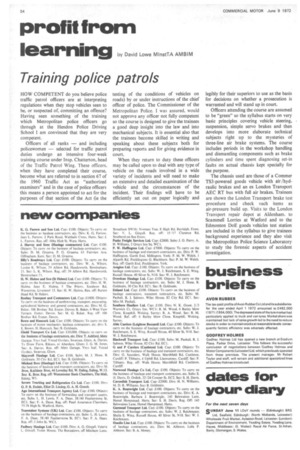profit from
Page 56

If you've noticed an error in this article please click here to report it so we can fix it.
learningby David Lowe MInstTA AMBIM
Training police patrols
HOW COMPETENT do you believe police traffic patrol officers are at interpreting regulations when they stop vehicles seen to be, or suspected of, committing an offence? Having seen something of the training which Metropolitan police officers go through at the Hendon Police Driving School I am convinced that they are very competent.
Officers of all ranks and including policewomen selected for traffic patrol duties undergo an intensive four-week training course under Insp. Chatterton, head of the Traffic Patrol Wing. These officers, when they have completed their course, become what are referred to in section 67 of the 1960 Traffic Act as "authorized examiners" and in the case of police officers this means a person appointed to act for the purposes of that section of the Act (ie the testing of the conditions of vehicles on roads) by or under instructions of the chief officer of police. The Commissioner of the Metropolitan Police. I was assured, would not approve any officer not fully competent so the course is designed to give the trainees a good deep insight into the law and into mechanical subjects. It is essential also that the trainees become skilled in writing and speaking about these subjects both for preparing reports and for giving evidence in court.
When they return to duty these officers may be called upon to deal with any type of vehicle on the roads involved in a wide variety of incidents and will need to make an extensive and detailed examination of the vehicle and the circumstances of the incident. Their findings will have to be efficiently set out on paper logically and legibly for their superiors to use as the basis for decisions on whether a prosecution is warranted and will stand up in court.
Officers attending the course are assumed to be "green" so the syllabus starts on very basic principles covering vehicle steering, suspension, simple servo brakes and then develops into more elaborate technical subjects right up to the mysteries of three-fine air brake systems. The course includes periods in the workshop handling and dismantling components such as brake cylinders and time spent diagnosing set-in faults on actual chassis kept specially for the purpose.
The chassis used are those of a Commer TS3-powered goods vehicle with air/hydraulic brakes and an ex London Transport AEC RT bus with full air brakes. Trainees are shown the London Transport brake test procedure and check such items as air-pressure build up. Visits to the London Transport repair depot at Aldenham, to Scammell Lorries at Watford and to the Edmonton DoE goods vehicles test station are included in the syllabus to give trainees background experience and they also visit the Metropolitan Police Science Laboratory to study the forensic aspects of accident investigation.




































































































